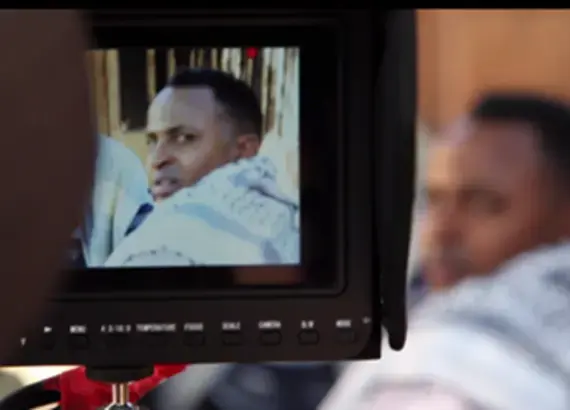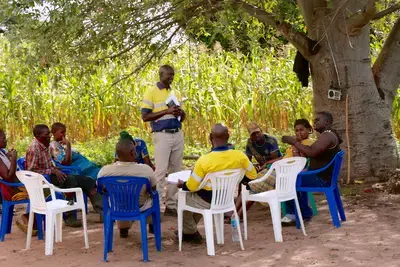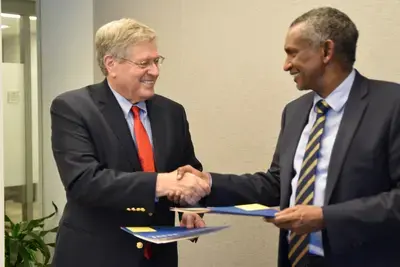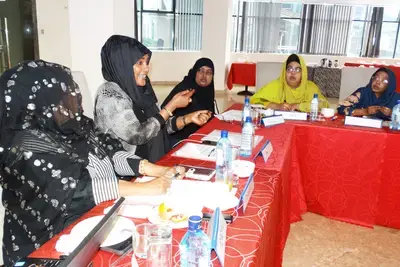
Success Story
Somalia Civic Education Campaign Involves Citizens Through Drama
Somalia’s new federal government, formed in late 2012, faces significant challenges as it seeks to rebuild institutions, revive services for citizens, and deliver on the promise of democracy after two decades of conflict.
A critical part of stabilizing the country lies in establishing a permanent constitution. But after years without a functioning central or federal government, Somalis lack access to basic information about political and constitution-making processes. A civic education campaign, focused on south central Somalia and Puntland as well as with Somali diaspora, is seeking to change that.
A series of 10 TV and radio dramas has helped educate citizens about the content of a provisional constitution adopted in August 2012, how to engage with political leaders about the constitution’s development, and how to take part in a constitutional referendum scheduled for 2016. Each drama covers a different subject area, such as the judiciary, state and religion, and human rights.
The first drama in the series, which illustrates the basic concept of how a constitution works, begins with a group of roommates who cannot seem to get along. They disagree on everything from noise, to smoking inside, to whose food is in the fridge — and they finally decide to come together to create a set of house rules that takes individual needs into consideration.
“The solution starts with respecting each other,” said one roommate.
As the dramas were aired on Somali media networks in summer and fall 2013, audiences had the opportunity to respond to the films via text message. “In my opinion, the rest of Somalia should come to a peaceful resolution just as the young men in the film did,” said one viewer.
According to public opinion research conducted by NDI in 2010 and 2011, Somalis have been cautious about the constitution. Specifically, they lack general understanding of the constitutional process, the provisional constitution’s contents, or how a federal system of government would work. The civic education campaign sought to address these knowledge gaps.
Although Somalis get some information from clan websites, radio, and online news sources, most have no direct access to newspapers or libraries, leaving them without accurate information about the constitution, why it is needed, how it works or how they can vote in the referendum, according to Mohamed Abdirizak, NDI’s country director for Somalia.
“We have to really share a lot of very basic information. We thought that we needed to take civic education to the next level by doing short films, instead of having the speaker of the parliament explain what is going on,” Abdirizak said of the decision to use drama to educate the public, building on civic education efforts from 2012. The current speaker served as chair of the Committee of Experts, the entity that led the drafting of the provisional constitution.
A talk show in front of a live audience initiated the series of short dramas. The show’s panel included Maryam Arif Qassim, chair of the Parliamentary Oversight Committee on Constitutional Review, a university student and members of Somali civil society. Qassim began by explaining basic concepts about the provisional constitution and how it came into being. The audience then could ask questions, such as how federalism would affect them, the role of young people in the constitution process, and whether Somalia’s federal parliament would try to learn from parliaments in other countries and Somali regional states.
On Sunday evenings in August and September, successive new dramas aired on TVs across the country, and were re-aired on TV and local radio stations. After each radio broadcast, a live call-in talk show allowed listeners to ask expert panelists about the constitution. Radio panelists included senior government officials such as Qasim and Abdullahi Hassan Jama, the chair of the former Independent Federal Constitution Commission, as well as religious authorities, legal and constitutional scholars, and clan elders. Nearly 100 listeners called in to radio stations throughout the series.
In one drama, a woman fights to allow her daughter the same education as her son. She discusses with a friend going to a community meeting that is attended only by men. The women, her friend says, are expected to stay in the home.
“I won’t accept the role,” she says. “The men can choose to meet me or not.”
“We must be guided by the law,” said a citizen in another film, after the son of a government minister accidentally hits a woman with his car. Instead of letting the mob of bystanders take matters into their own hands, a few witnesses turn the man into the police to let him stand trial through the court system.
The 10 topics covered in the dramas are the constitution; state and religion; the executive branch; the legislature; land and property; political parties; security and reconciliation; the judiciary; women’s empowerment and federalism.
Read more:
Published March 28, 2014



